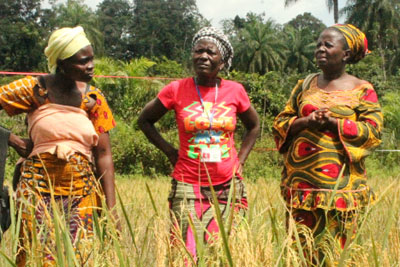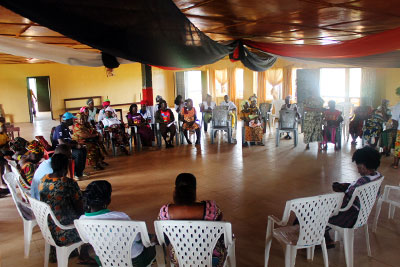In Liberia, mobile banking to help Ebola-affected women traders
Hard-hit by closed markets and travel restrictions, some 2,500 women cross-border traders will receive cash transfers via mobile technology from the Central Bank of Liberia with a grant from UN Women to help them save and expand their businesses.Date:

Liberia — In the small city of Bopolu in Gbarpolu County, about 150 kilometers from Liberia’s capital, Monrovia, the devastating effects of the Ebola Virus Disease and local efforts to curtail it are pushing once-promising rural women entrepreneurs out of business.
“Goods that we were buying, we cannot get them here anymore,” explains Mary Gayflor, a local trader in Bopolu. “We couldn’t leave from here to go to Monrovia to buy and customers didn’t come to our businesses. As a result, we started eating up (spending) the money that we had for our business.”
Prior to the latest Ebola outbreak in Liberia, local businesswomen in Bopolu watched their profits grow as part of UN Women’s Women in Cross Border Trade programme – which created a bargaining platform for women traders, business development skills and literacy training, increased access to loans and improved travel conditions between countries and regions. The programme enabled them to borrow and repay loans through a Village Savings and Loan Scheme.
But since the Ebla outbreak, the women say their sales have dropped significantly. Travel between regions of Liberia has been restricted, commercial drivers ordered to reduce the number of passengers onboard, mandatory body temperature checks instituted, development projects halted, some market centres shut down, and mass public gatherings banned.
Women engaged in internal trade are also grappling with transport fares increasing by nearly 70 per centand goods perishing due to travel restrictions that delay their delivery.
In a country where approximately 85 per cent of daily market traders are women[1], Ebola prevention measures are having a drastic impact on their livelihoods and economic security.

“The Ebola crisis has made it difficult for us to continue our business because when the Ebola started, we could not go to buy our goods. So we are forced to sell petty businesses with a small profit,” says Dedeh Fawen, President of the Gbarpolu Women in Cross Border Trade.
Dedeh and other members of the Women in Cross-Border Trade programme are now worried about defaulting on their loan repayments after borrowing money from the Central Bank of Liberia through the UN Women-supported Village Savings and Loan Association (VSLA), to invest in various businesses.
“Since UN Women and Educare trained us how to save our money and manage our businesses, I was able to own plenty of shares in the VSLA. But now, because of this Ebola outbreak, I have used all my business money to pay my monthly due, so I am just sitting at home right now doing nothing,” says businesswoman Juah Sloh, of Henry Town, Gbarpolu County.
Seeing that several VillageSavings and Loan Associations established under the Association of Women in Cross-Border Trade programme defaulted on loan payments, UN Women will support the Central Bank to provide around 2,500 women traders under these existing associations with direct cash transfers. The grant from UN Women aims to help these women strengthen their capacity to restart or expand their businesses.
The funds will be channeled through technology for financial transactions using mobile phone company Lone Star Cell MTN.
UN Women is also supporting social safety nets that respond to the needs of women affected by the Ebola crisis, and strengthening the capacities of women and communities to create rural networks for affected families. Another major focus is on psychosocial support, reintegration of families affected by Ebola, as well as early recovery for women who have been severely impacted by the crisis.
[1] 2007 “God First, Second the Market”
Related articles:
At the frontlines, Liberian women adopt new strategies in Ebola response